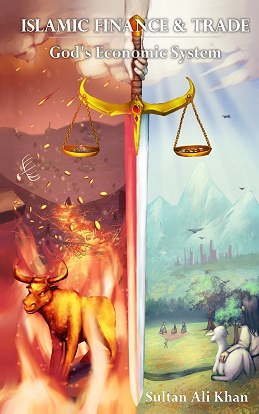What is the definition of Riba in the Quran? (God’s proposed economic structure – part 1)
[278. O believers! Fear Allah and relinquish what is outstanding from Riba, if you are indeed believers. 279. And if you do not, then take notice of war from Allah and His Messenger. But if you repent, you will have your Rausu Amwalakum (actual capital). Wrong not, and you shall not be wronged. 280. If the Debtor faces hardship, then grant him time till things are easier for him to repay; but if you waive it as charity, that is best for you if you only knew.] [Quran Surah Al-Baqarah 2 Ayat 278-280]
Relinquish Riba, but what is Riba?
1) You relinquish a right that you have. So you had a right to get Riba, but Ayat 278 says to relinquish it – i.e. give it up.
2) Ayat 279 explains that if you relinquish the Riba and Repent, then “You shall have your Rausu (Actual/Exact) Amwal (Wealth, derived from cattle – how wealth was measured in old times) akum (Yours) “. So you have a right to your “actual wealth”. The only financial transaction where a party has a right to their “actual wealth” is a debt transaction. This is further collaborated in Ayat 280 which speaks of the Debtor/Borrower faces hardship, confirming we are referring to debt transactions.
3) So if the lender has the right to their Rausu Amwalakum (actual wealth/capital), then anything over and above this Rausu Amwalakum is by definition Riba, no matter how big or small, or how it is called or structured and transacted.
This definition is beautiful in its simplicity, while completely capturing all types of Riba structures. Bottom line is there is no benefit allowed in debt transactions.
We see in the Hadith that the companions and the Prophet (PBUH) used to enter into debt transactions based on liquid commodities, such as camels or dates etc. So for example, if a two year old black she camel was borrowed for 6 months; then after six months the borrower would go to the camel market and buy another two year old black she camel to return to the lender. Therefore, the lender takes NO depletion, depreciation or inflation risks and simply get back their Rausu Amwalakum (actual wealth/capital).
We have already seen that in the Torah, Psalm, Old Testament, Gospel and Quran no benefit (interest/usury/riba) has been allowed on loans.
So how should the economy and financial intermediation be structured?
The book “Islamic Finance and Trade: God’s Economic System”, is the culmination of over 25 years of research, to present the answer to the above question. You are kindly invited to Read, Review and Recommend the book. It is available at https://a.co/d/7N6tOVs and on all Amazon sites.

